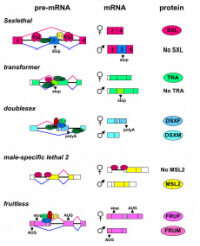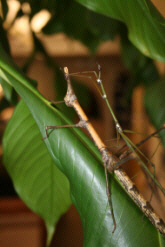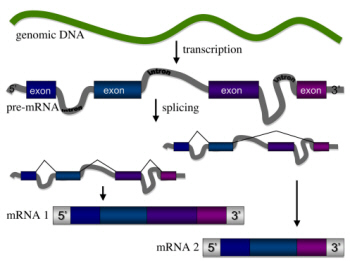|
HOME TEACHING RESEARCH OFFICE HOURS SCHEDULE LAB MEMBERS LINKS |
||||||
|
Widener Science Chemistry Biochemistry
Last Updated: 12/12/2012 |
|
|||||
|
Image by Andre Karwath |
||||||
|
Main Research Interest: |
||||||
|
The genome of the simple fruit fly contains approximately 15,000 genes while that of a more complex human contains only twice that with 30,000. This apparent discrepancy between gene number and complexity can be reconciled by considering alternative splicing, a universal biochemical mechanism that works similarly in diverse organisms from yeast to worms to insects to humans. The process of splicing, whether general or alternative, regulates gene expression and maximizes and the number of proteins that one gene can produce. With over 70% of human genes predicted to be alternatively spliced, many human diseases including cancer have been attributed to mutations in splice site selection signals or the splicing machinery itself. Yet little is known about the earliest and most critical steps of splicing regulation, when intron and exon borders or pre-mRNA are first recognized and defined by the spliceosome. Our lab takes advantage of the wide spectrum of genetic manipulations and biochemical analysis possible in flies to examine the function of proteins integral to tissue specific alternative splicing. |
||||||
| Current Projects: | ||||||
|
|
Detection of alternative splicing events in flies fed a high nutrient or low nutrient diet by RT-PCR and qPCR | |||||
| Decrease the concentration of splicing factors by genetic RNAi knockdown using tissue-specific gal4 drivers and examine the effect on sex determination | ||||||
|
|
Characterize the effect of resveratrol, resveratrol-derivatives and diet on lifespan and nutrient storage | |||||
|
Identification of alternative splicing between males and females in the sexually dimorphic insect Stiphra sp. using the Drosophila melanogaster sex determination pathway as a model |
  |
|||||

.jpg)